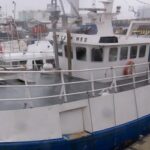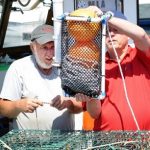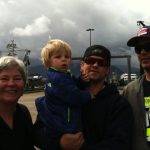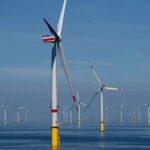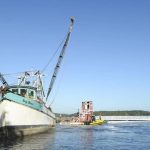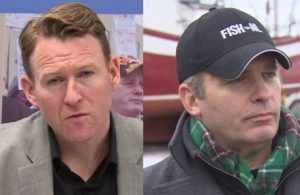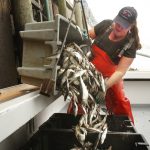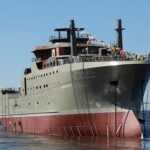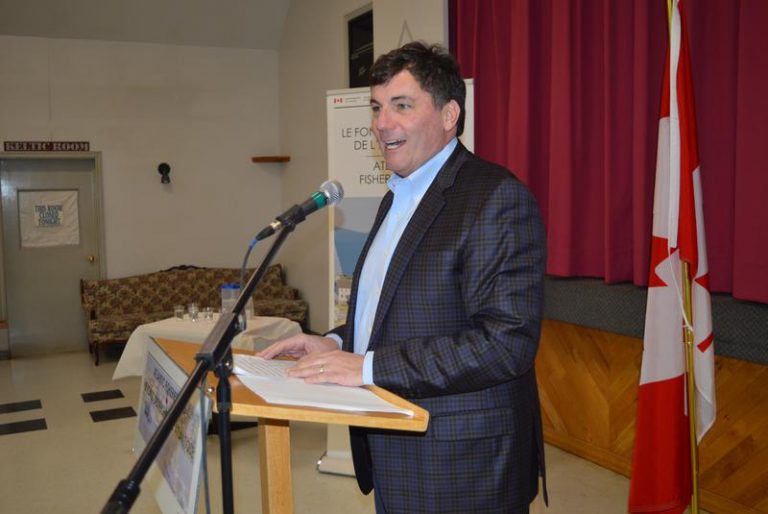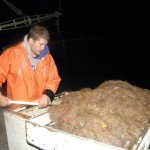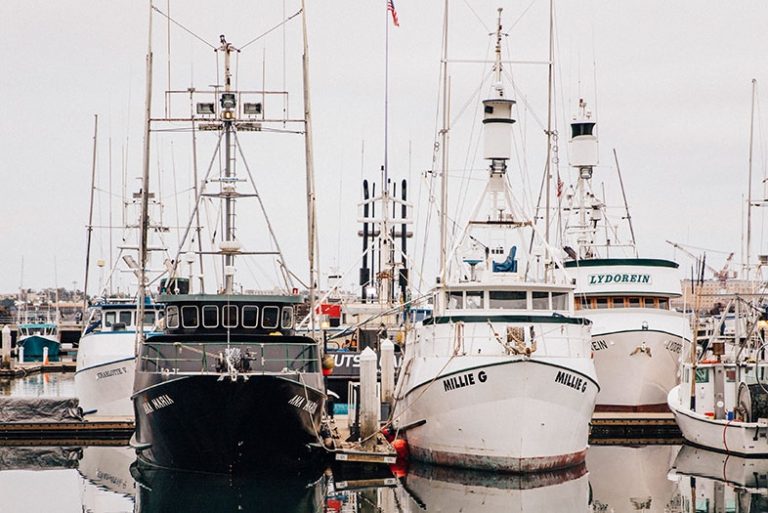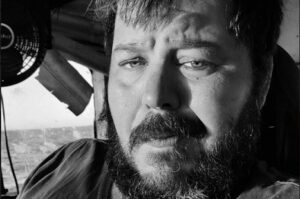Tag Archives: land based aquaculture
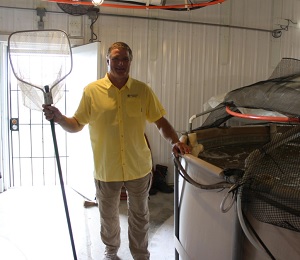
But, there is no sea in Kansas! Fresh Seafood In Landlocked Kansas? ‘I Can’t Grow It Fast Enough.’
When Bob Daniels started telling people he wanted to start a shrimp farm in the middle of Sumner County, the response was what you might expect. “‘You’re going to sell bait, huh?'” he said laughing while recalling one comment. “In fact, when we started looking to grow the shrimp and look for some financing … the local banker said, ‘Well, you’re never going to sell this.’ “Now, it turns out, I can’t grow it fast enough to sell what people were willing to buy.” >click to read< 10:22
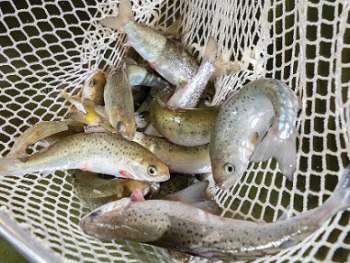
Land-based salmon farm proposed for Chesapeake’s Eastern Shore
AquaCon executives intend to build a $300 million indoor salmon farm on the outskirts of Federalsburg in Caroline County. By 2024, they aim to harvest 3 million fish a year weighing 14,000 metric tons — an amount on par with Maryland’s annual commercial crab catch. If that goes as planned, the company expects to build two more land-based salmon farms on the Shore over the next six or seven years,,, Another Norwegian company is preparing for its first full harvest later this year from a facility south of Miami, and plans have been announced to build big indoor salmon farms in Maine and on the West Coast. Two small U.S.-based salmon operations in the Midwest also are moving to expand production. >click to read< 07:12
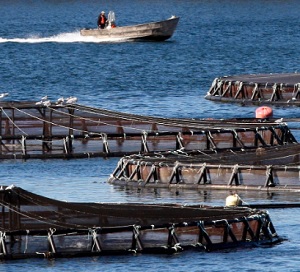
Opposition grows to expanding fin fish farming
The Trump administration and the aquaculture industry said the order, which is being implemented now, represents common sense steps to ease the burden of rules on fish farmers. “They’re trying to somehow connect open-water aquaculture with the need for domestic food. But it just doesn’t make sense,” said Marianne Cufone, executive director of the Recirculating Farms Coalition,,, Some fishing groups have also come out in support of the order. Scot Mackey, director of government affairs for the Garden State Seafood Association, which advocates for fishermen as well as farmers, said the order “will help the industry weather the current crisis and come back stronger.” Neville Crabbe, spokesman for the Atlantic Salmon Federation, a conservation group, said the federal permitting process should be creating land-based aquaculture rather than fish farms in the ocean, let alone offshore. >click to read< 18:13
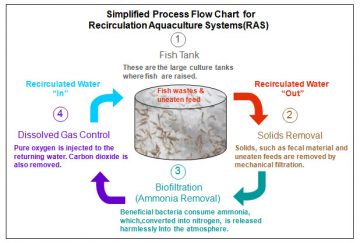
Fish Farming – Bio-security for Fish Rearing: Re-circulating Aquaculture Systems
Re-circulating Aquaculture is a technique for raising water borne animals in a closed (usually indoor) system which minimizes water consumption, provides maximum control of the livestock’s environment, and reduces the risk of exposure to parasites, disease, and predators High Density Re-circulating Aquaculture System (HDRAS) is a system in which aquatic organisms are cultured in water which is serially reconditioned and reused. Closed-system aquaculture presents a new and expanding commercial opportunity. Re-circulating aquaculture systems (RAS) are tank-based systems in which fish can be grown at high density under controlled environmental conditions. They are closed-loop facilities that retain and treat the water within the system. >click to read<09:33
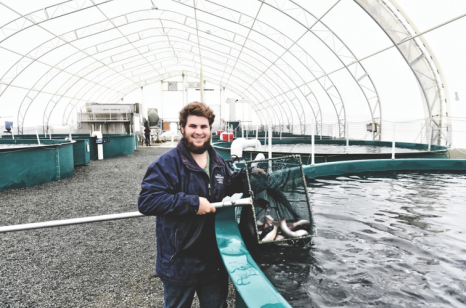
Land Based vs Open Pen Aquaculture – Fish out of ocean water dampen aquaculture enterprise
Some day, it might be possible to raise salmon in land-based closed containment ponds and make a profit. But that day is still a long way off, and even when it does become economically viable, land-based aquaculture might be like organic farming: an option for consumers willing to pay a premium, but which can’t replace ocean-based salmon farming. That’s not just the conclusion reached by the BC Salmon Farmers Association (BCSFA), it’s also the opinion of a Nanaimo businessman who owns a land-based fish farm. click here to read the story 12:39
Letter: We’ve seen the future, and it’s land-based – John McCarthy
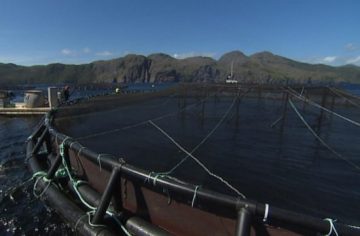 I write in response to a letter written by Leon Fiander from Marystown on Oct. 18, “Will Placentia Bay aquaculture affect native salmon?” Our group, Salmon Preservation Association for the Waters of Newfoundland (SPAWN), has met with Environment Minister Perry Trimper and provincial officials, executive director Mark Lane and other officials of the Newfoundland Aquaculture Industry Association, Gudie Hutchings, MP for Long Range Mountains, and others. We have tried to establish exactly what is being proposed for aquaculture in Placentia Bay. We have a good track record of meeting and working with industry to mitigate potential environmental issues and have worked out of the public eye with Kruger and other industries successfully over the years. We continue to correspond with Mark Lane regarding the interaction between aquaculture and our environment. Fiander’s letter appears to us to be more like a job application than an actual letter of approval for Placentia Bay sea-cage aquaculture. Read the rest here 12:08
I write in response to a letter written by Leon Fiander from Marystown on Oct. 18, “Will Placentia Bay aquaculture affect native salmon?” Our group, Salmon Preservation Association for the Waters of Newfoundland (SPAWN), has met with Environment Minister Perry Trimper and provincial officials, executive director Mark Lane and other officials of the Newfoundland Aquaculture Industry Association, Gudie Hutchings, MP for Long Range Mountains, and others. We have tried to establish exactly what is being proposed for aquaculture in Placentia Bay. We have a good track record of meeting and working with industry to mitigate potential environmental issues and have worked out of the public eye with Kruger and other industries successfully over the years. We continue to correspond with Mark Lane regarding the interaction between aquaculture and our environment. Fiander’s letter appears to us to be more like a job application than an actual letter of approval for Placentia Bay sea-cage aquaculture. Read the rest here 12:08
Maine aquaculture firm financed for land based California yellowtail farm
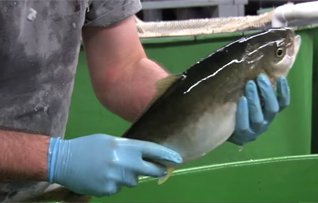 Maine, U.S.A.-based aquaculture firm Acadia Harvest has completed a new round that will give it USD 700,000 (EUR 623,000) to build out a land-based fish farm in Corea, Maine that will have a one-million pound capacity. The Company plans to open its plant in late 2017. The capital, which comes from a combination of private and institutional investment, will allow the company to fund land acquisition, development and operation permits and some build-out of the farm, which it said would focus on growing California yellowtail it will market as “Maine Hiramasa. Acadia Harvest is also researching the use of fish waste as nutrition for other commercial species, and in developing sustainable aquafeeds. Read the story here 10:25
Maine, U.S.A.-based aquaculture firm Acadia Harvest has completed a new round that will give it USD 700,000 (EUR 623,000) to build out a land-based fish farm in Corea, Maine that will have a one-million pound capacity. The Company plans to open its plant in late 2017. The capital, which comes from a combination of private and institutional investment, will allow the company to fund land acquisition, development and operation permits and some build-out of the farm, which it said would focus on growing California yellowtail it will market as “Maine Hiramasa. Acadia Harvest is also researching the use of fish waste as nutrition for other commercial species, and in developing sustainable aquafeeds. Read the story here 10:25

































